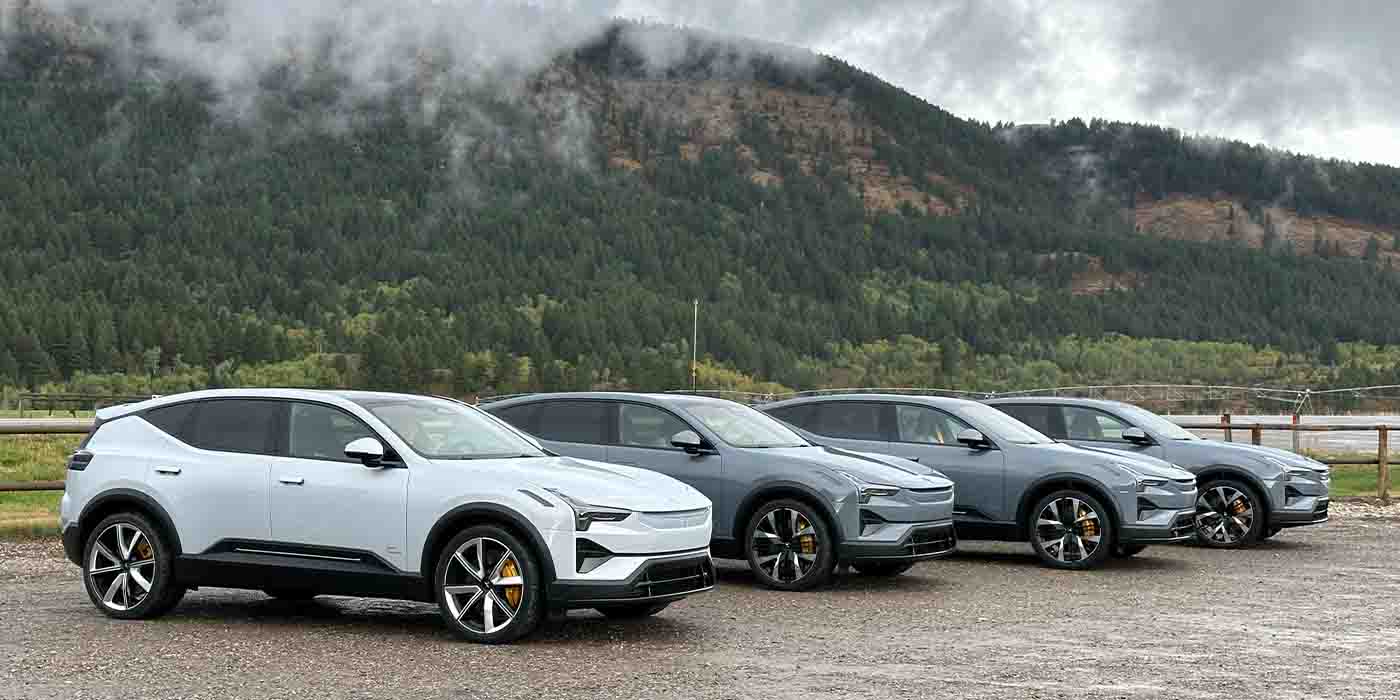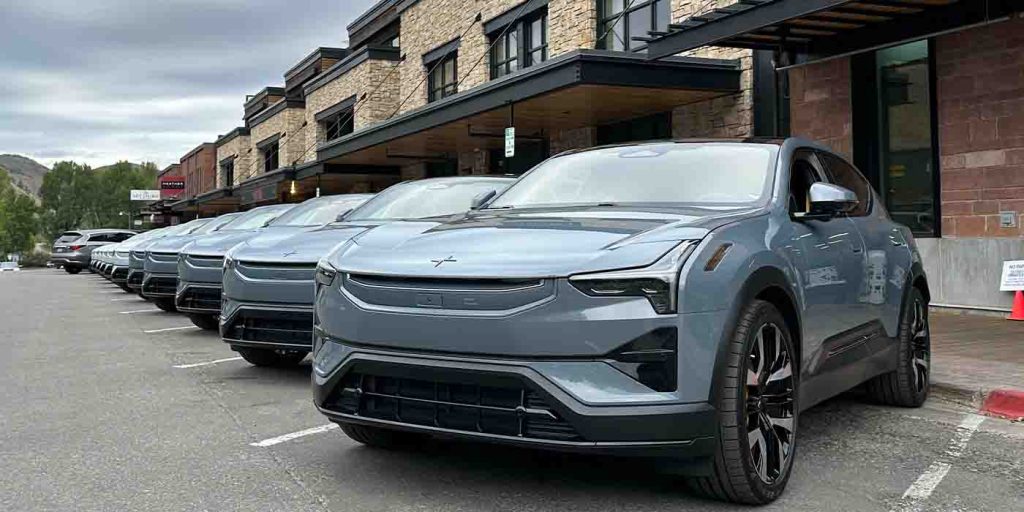
The Polestar 3 has long been promised to be the first true branded BEV from the Volvo- and Geely-owned automaker, and it has a lot riding on its success. After taking a trip out to Jackson Hole, Wyoming, to test drive both variants of the Polestar 3, I think this SUV is something pretty special inside and out.
Table of contents
A quick background on the Polestar 3 SUV
The Polestar 3 is a new SUV from the EV brand that is majority-owned by China’s Geely Holding. It was initially announced in October 2022. In addition to being the first SUV from Polestar ($PSNY), it will also be the first model built on US soil in South Carolina.
The SUV was initially scheduled to launch in Q4 2023, but Polestar delayed its arrival to Q1 2024, citing the need for more time to develop the software used in its platform shared with Volvo Cars and the EX90.
In February, however, Volvo announced it would sell most of its stake in Polestar. Regardless, the brand has pushed ahead in China with Geely as initial production began overseas that same month.
The first deliveries of the all-electric SUV began in late June before the US builds commenced last month. My trip was a rare instance of test-driving an EV for the first time that’s already on the market, but I have been giddy about the opportunity to do so nonetheless and share my thoughts with you, so let’s dig in.

Specs of the first two Polestar 3 variants
At its initial US launch, the Polestar 3 SUV arrived in two dual-motor variants, including a Long Range version we referred to as the “basic” model during the drives and a Long Range 3 with Polestar’s Performance Pack, offering more horsepower and acceleration (plus sweet gold seatbelts you can peep below).
Polestar has since shared plans for a third, more affordable SUV variant, complete with a single RWD powertrain. However, that’s not coming to North America until later this year, so we will focus on the two versions I drove. Here’s how the specs stack up:
| Polestar 3 Variant | Long Range Dual Motor | Long Range Dual Motor +Performance Pack |
| Powertrain | Dual Motor | Dual Motor |
| Power | 489 hp | 517 hp |
| Torque | 620 lb-ft | 671 lb-ft |
| Acceleration (0-60 mph) |
4.8 seconds | 4.5 seconds |
| Top Speed | 130 mph | 130 mph |
| Battery Size (NMC) | 111 kWh (nominal) / 107 kWh (usable) |
111 kWh (nominal) / 107 kWh (usable) |
| Energy Consumption (EPA) | 38.9 kWh/ 100 miles | 43.2 kWh/ 100 miles |
| Range (EPA) | Up to 315 miles | Up to 279 miles |
| Drag Coefficient | 0.29 Cd | 0.29 Cd |
| AC Charging | Up to 11 kW (0-100% in 11 hours) |
Up to 11 kW (0-100% in 11 hours) |
| DC Charging | Up to 250 kW (10-80% in 30 mins) |
Up to 250 kW (10-80% in 30 mins) |
On paper, the Polestar 3’s specs are more than adequate but by no means blow you away. However, if you’ve ever driven the Polestar 2 BST or the RWD version, you can understand that these EVs are simply built differently and drive better than most vehicles out there today.
That’s partly due to Polestar’s mechanical engineer Christian Samson and his team at the design center in Gothenburg, who have once again put their tuning expertise into Polestar’s latest model. The result is noticeable but also quite unmatched. Here are my thoughts.
This SUV is amazing, even without the Performance Pack
During my day of driving up and around Wyoming and through Idaho, I took in some beautiful vistas around the Tetons despite the rain (and a little bit of snow). During that trek, I got time behind the wheel of both Launch Editions of the Polestar 3 SUV, including the Dual Motor version, which includes Polestar’s Plus and Pilot Packs (in the “Snow” exterior seen above), as well as the Performance Pack Version in “Thunder” down below.
My first impression, and something I’ll probably revisit several times as you read on, is how smooth of a ride this SUV delivers. As the Polestar team shared with us during a presentation before, the drive, handling, steering, and performance are at the core of its product identity, alongside other important factors such as range, efficiency, sustainability, U/X, and ADAS.
The design team put a lot of effort into the abundant and refined body control in the Polestar 3 SUV to deliver a playful but balanced ride it hopes will propel the young(ish) brand to status as the first choice for proper drivers due to its precision and distinct road contact.
After driving both these variants, I have to say Polestar knocked it out of the park. I don’t know if I’ve experienced a ride as smooth and as comfortable as the 3, whether I was behind the wheel or riding shotgun with my driving partner.
If you’ve read about my drive experiences in the past, you’ll know I’m a stickler for regen and love one-pedal driving, and the Polestar 3 is some of the best I’ve encountered to date. It’s perfectly calibrated and stiff as hell when you want it to be, yet its deceleration is so utterly smooth that you are never jerked forward. This is what one-pedal driving should be—Chef’s kiss.
I was a massive fan of the small driver’s display above the steering wheel. It remained in clear sight and perfectly displayed all the pertinent information right where I needed it and is a perfect example of Polestar’s nod to its Scandinavian roots with a minimalist yet functional design approach.
On the way back in the Polestar 3 with the Performance Pack, we encountered one software error in which the driver display malfunctioned (see error message below). The vehicle kept working perfectly, including Pilot Assist ADAS, although there were no indications it was on. Other metrics like speed went dark as well. The HUD still projected but didn’t show any information.

Once I pulled over and turned the SUV off (which required a quick Google search since this model doesn’t have a start/stop button), I could restart it, and everything booted up just fine. It was a minor bug with a quick solution, but it is worth mentioning.
I also found the HUD to be completely adequate during my drive time. It was nothing special as it only displays the speed limit and your current speed, but it was easy to see, even through all the elements outside.
Another feature I enjoyed was the 25-speaker system with Dolby Atmos from Bowers & Wilkins, which comes with the Plus Pack upgrade. The sound quality was incredible, and you can switch between different simulated environments, including “Stage” and “Room.” Dark Side of the Moon never sounded better.
While the Polestar 3’s acceleration specs may not blow you away on paper, don’t get it twisted; this SUV is sneaky fast. Again, I have to give credit to how well the EVs have been tuned because you can not only easily overtake a car whenever you want, but you also feel in complete control the entire time and always have an excellent feel for where the front wheels are.
I don’t want to incriminate myself here, but on the empty country roads in Wyoming, my driving partner and I were able to get the Polestar 3’s speed well into the triple digits, sometimes without even noticing. I experienced this sensation as both a passenger and a driver – you can easily be going 118 mph, and it feels as smooth and calm as if you were going 55 mph. It’s unreal.
The overall aesthetic of the Polestar 3 SUV is one of cleanliness and quality. The textiles, many of which are recycled materials, are comfortable and bring an feeling of premium quality to the vehicle. I preferred the interior of then Performance Pack version personally, but when it’s all said and done, I think the regular olf Dual Motor version is where it’s at
Final thoughts, pricing, and availability of the Polestar 3
Overall, I was quite impressed with the Polestar 3 and highly recommend taking the SUV for a test drive yourself to truly understand what I’m talking about when I describe how well it has been tuned. While I thoroughly enjoyed both variants, I personally would opt for the Launch Edition Dual Motor version with the Plus and Pilot Packs.
The Performance Pack does offer some extra oomph, but I don’t think it’s significant enough to herald the higher price tag unless you just have to have those gold seatbelts (understandable).
The Launch Edition Polestar 3 starts at an MSRP of $73,400 and costs $79,400 with the Performance Pack. Both options are on sale now, and if you buy one, you should get one of the early Polestar SUVs built here in the US.
FTC: We use income earning auto affiliate links. More.













